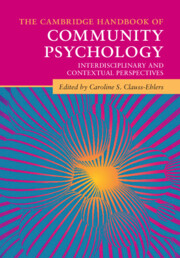Book contents
- The Cambridge Handbook of Community Psychology
- The Cambridge Handbook of Community Psychology
- Copyright page
- Dedication
- Contents
- Figures
- Tables
- Contributors
- Foreword
- Part I Foundational Concepts
- Part II Research, Assessment, and Program Evaluation
- Part III Community Psychology in Action
- Part IV Where Do We Go from Here?
- 29 Responding to Gaps in Research and Practice in Community Psychology
- 30 Rewriting the Community Psychology Narrative
- Index
- References
29 - Responding to Gaps in Research and Practice in Community Psychology
from Part IV - Where Do We Go from Here?
Published online by Cambridge University Press: 16 December 2021
- The Cambridge Handbook of Community Psychology
- The Cambridge Handbook of Community Psychology
- Copyright page
- Dedication
- Contents
- Figures
- Tables
- Contributors
- Foreword
- Part I Foundational Concepts
- Part II Research, Assessment, and Program Evaluation
- Part III Community Psychology in Action
- Part IV Where Do We Go from Here?
- 29 Responding to Gaps in Research and Practice in Community Psychology
- 30 Rewriting the Community Psychology Narrative
- Index
- References
Summary
While community psychologists show commitment to social justice concerns, there has been a long-standing neglect of critical social scholarship in knowledge produced in the field. It is useful to see power as an organizing principle in community psychology, to further critical reflection about the theories and methods adopted in community research and their implications for transformative practice. We present the findings of an empirical study of trends in community psychology journals, showing that community psychologists study a wide range of topics, with emergent interests in children, youth and families, and difference and exclusion. However, there remains a preference for preventionist theory and likewise a stronger focus on social epidemiology and a paucity of empirical research employing critical and participatory methods. Thus, community psychologists still rely too heavily on individualist and biomedically oriented epistemological foundations and methods. We argue the dominant epistemological positions can be shifted through enhancing criticality and understandings of power, to address gaps in theory and method. We advocate for the importance of fostering reflexivity; critical consciousness and critical action; developing a sense of historicity in understanding communities; strengthening interdisciplinarity and extradisciplinarity; and endorsing methodological pluralism, innovation, and concern for the social impact of knowledge.
- Type
- Chapter
- Information
- The Cambridge Handbook of Community PsychologyInterdisciplinary and Contextual Perspectives, pp. 623 - 652Publisher: Cambridge University PressPrint publication year: 2021

